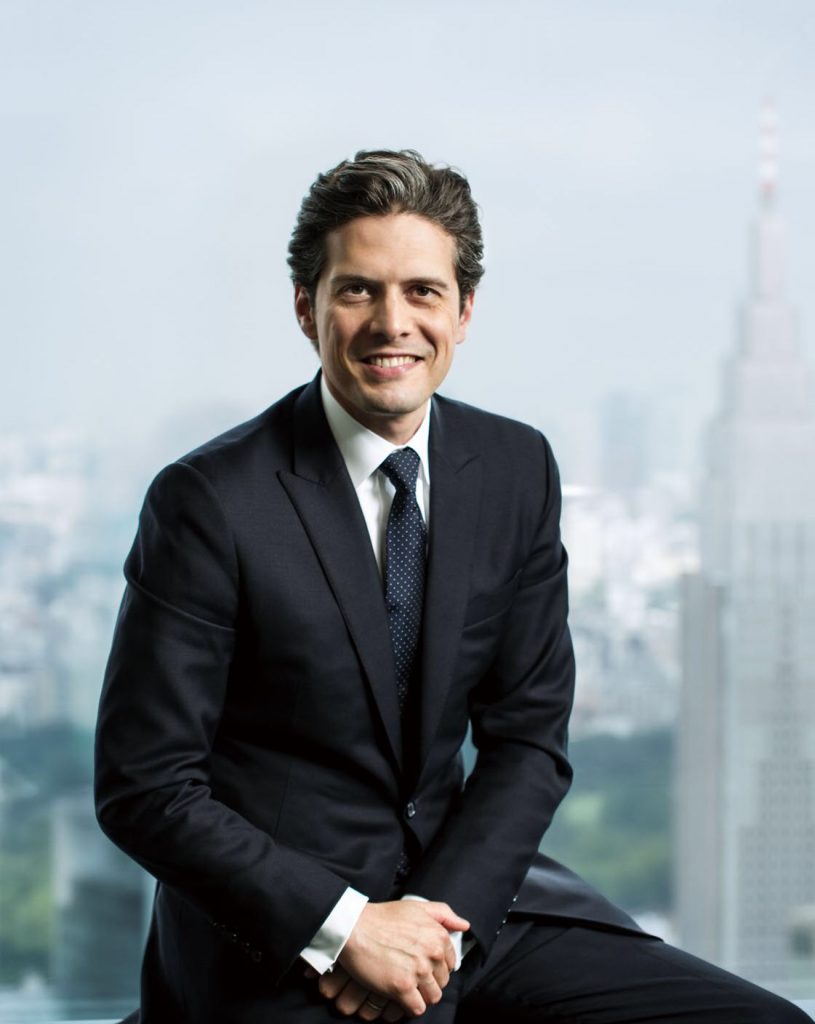Skift Take
Empathy. When was the last time you heard a hotel executive talk about that? General manager Hervé Mazella shares his views on service, what makes the Park Hyatt Tokyo unique, and what he has learned from the Japanese approach to hospitality.

On Experience
Colin Nagy, a marketing strategist, writes this opinion column for Skift on hospitality and business travel. On Experience dissects customer-centric experiences and innovation across the luxury sector, hotels, aviation, and beyond. He also covers the convergence of conservation and hospitality.
You can read all of his writing here.
The Park Hyatt Tokyo is unquestionably one of the world’s best-known hotels. Propelled to widespread fame after Sofia Coppola’s Lost in Translation, the Kenzo Tange designed tower is a modern classic that continues to stand out in one of the world’s most competitive hospitality markets.
The hotel hums every day with quiet, purposeful intensity from its staff, and ranges from the zen of the Peak Lounge to the late-night bustle of the New York Grill.
In order to understand how the hotel works every day from end-to-end, including what we feel is the world’s best arrival, Skift caught up with general manager Hervé Mazella on how he approaches running the hotel, his unique approach, and why hospitality is actually a very egalitarian thing, rooted in empathy and care. As hotel competition heats up in Tokyo as it gets closer to being on the world’s stage of the Olympics host in 2020, the classic blend of Western and Japanese hospitality exhibited by the hotel will find a new audience, stewarded by capable hands.
Skift: What did you learn about your time working in gastronomy and the Michelin starred worlds? Attention to detail, or something more?
Hervé Mazella: Attention to detail is definitely a key factor of the Michelin world of gastronomy. However, more importantly, you need to master the skill in instinctively knowing what the tastes and preferences of the guests we cater to.
It requires finesse of observation and being observant of emotions. You need precise execution for the planning and organization balanced with emotions and trying to reach all of the five senses.
I also enjoy being surrounded by people who are so passionate and dedicated to their area of expertise, using the best produce coming from suppliers as dedicated and passionate as the chefs, the same goes for wines and also with the craftsmanship you can experience for every tool or equipment you are using for the table setting and for other preparations. There must be a reason why we call it “Art de la Table”.
Skift: What have you learned that you will apply for the rest of your career?
Mazella: Humility in hospitality is important. When I was Maître D’Hotel in a 3-star Michelin restaurant, at times the restaurant manager during the briefing just sent me off to change into jeans and polo shirt as there were lower numbers for that meal period and you don’t want guests to feel uncomfortable with much more staff than guests. Therefore it was the rule that some staff had to be sent to do some cleaning work or gardening instead of being in the dining room doing not much. I remember very well being by the water, on the jetty on my knees cleaning with a brush and a bucket in front of all our regular guests seating on the terrace drinking Champagne. I did it regardless.
Skift: People feel like great hospitality is only reserved for people paying a lot of money. Why do you think it is egalitarian?
Mazella: Great hospitality does not depend on how much money one spends. There are many different pillars within pillars of offerings in hospitality. Just because you are dining at a high-end restaurant or hotel, does not necessarily warrant the best hospitality experience. It is the small yet meaningful gestures such as a bellman handing a guest a bottle of cold water and a towel after coming back from a hot day or a run outside that I feel is a greater hospitality experience.
Guests leave your hotel happy and share compliments which is a great feeling, but still, you must make a point to ask, what could we do to make it better next time, what did you love the most about your room, what would you improve? The same goes for the dining experience etc. And once you get feedback, do something about it. We encourage our team to have genuine conversations with our guests to best understand their needs and expectations. Observing the unseen signals is also very important. You can learn a lot by being observant and by paying attention.
Skift: What do you think is the role of a hotel in people’s lives?
Mazella: The role of the hotel could be many things. For some, the frequent traveler requires a convenient and hassle-free service or for others a place to celebrate an occasion, but there are as many purposes for a hotel to stay or experience as there are different people.
For example, we have many guests who live in Tokyo who just come to stay at Park Hyatt Tokyo to spend time with our team who look after them, share moments and experiences. I believe it is a sense of place for many people, and that a hotel itself adds to the travel experience and the destination.
Skift: What about the guests of the Park Hyatt make it special?
Mazella: One of the “golden rules” of our industry is discretion and to not comment about our guests. We respect their discretion. Each hotel room encloses one’s personal life and it is our role at the hotel to protect their trust in us. In the olden days, you could say we are like “Swiss bankers” but today saying that could sound controversial. We want our guests to feel that we are inclusive and that whatever specialty/particularity each and every one has, he has his place with us, we do not judge anyone here at Park Hyatt Tokyo, we do our best for each individual to feel welcome and look after.
Skift: How will the Park Hyatt evolve over time? How do you edit a modern classic?
Mazella: With care. We do not believe that the hotel needs a complete revamp as the vision and atmosphere that John Morford has created needs to retained and respected.
Park Hyatt Tokyo has a strong identity, and no need to undo and redo everything as new. In addition we benefit from having operated this hotel for 25 years, so we need to look at how and what could we do better instead of erasing the good things ending with an outcome which would end up being not as good as the original.
Skift: What do you like working with the Japanese in terms of hospitality?
Mazella: I feel that hospitality is deeply-seated in Japanese people and I can really relate to that. When I first moved to Tokyo, my wife and I were helped by a young Japanese couple when we were making our way through a very busy travel season. They insisted on guiding us and went above and beyond what was required. They were nice, cheerful and genuine. In the course of the conversation that day, the lady disclosed her dream would be to work in a hotel. Skip forward to today, she finished her University study and now works at the Park Hyatt Tokyo, flourishing in her job in F&B.
Skift: What have you learned that you will apply in the rest of your career?
Mazella: I have not finished learning. I still learn every day. It is important to make the basics right. People are what makes our business and I see myself working towards developing people together with me. I like to focus on the positive aspects in things to make the situation better for everyone involved.
I have also learned that everyone has a hospitable side and it just needs to be revealed. If you extend an amazing experience to somebody, that person will be directly affected by that and will maybe want to extend it to someone else. Therefore should you wish someone to be hospitable, be hospitable to that person so she/he knows what it is and how it feels. It’s a simple equation.
Skift: One of your earlier posts was in Egypt during the Arab Spring. What did you learn in a so-called “hardship post.” Is is about improvisation or something else?
Mazella: We just had our second son, the hotel was doing very well, with the planned renovation progressing. I was about to get promoted further, and we said to each other “It is very nice living here, all comes perfectly into place, Life is good here, truly, what can happen?”
We spoke too quickly, the following day, the people started to go into the streets of Cairo against the power in place at that time. All TV channels started to broadcast the events 24/7. After a couple of days as the police left the streets the Army kind of took over and the population created some militia to try to keep things in order. Embassy after embassy, orders of evacuation were given.
I stayed at the hotel which was located at a strategic square. There were literally 16 tanks parked by the hotel entrance protecting the square at its 4 corners. I could write pages about the different steps and the way things have evolved but the big takeaway is it required teamwork and improvisation. Everyone needed to work closely. I learned I needed my team more than ever behind me to look after the guests who started to come back a couple of months later. The team members were going through tremendous difficulties not being able to buy meat and food anymore for their families, but everyone rallied together to solve problems every day. Behind every single associate, there is a whole family and we are even more responsible for those when times become so challenging. This was one of the first experiences of crisis management in my career. This is also where networking is important and keeping calm under any circumstances.
Skift: How do you create the perfect hotel arrival?
Mazella: There is always room for improvement, especially during busy times, we wish we could extend the perfect hotel arrival to every guest. I believe it is from the simple gesture of greeting our guests by their name on arrival whenever possible. This is what truly makes a great impression.
Skift: What would you say you and your teams signature touch is as a hotelier?
Mazella: Empathy and care are key components. Also, being true to our values. Even when removing the logo from collateral, you should feel and sense what brand it is; same goes with a hotel décor, atmosphere, look and feel and experiences.
Have a confidential tip for Skift? Get in touch
Tags: On Experience, tokyo olympics
Photo credit: The Peak Lounge at Park Hyatt Tokyo. The Park Hyatt Tokyo is unquestionably one of the world’s best-known hotels. Park Hyatt Tokyo

